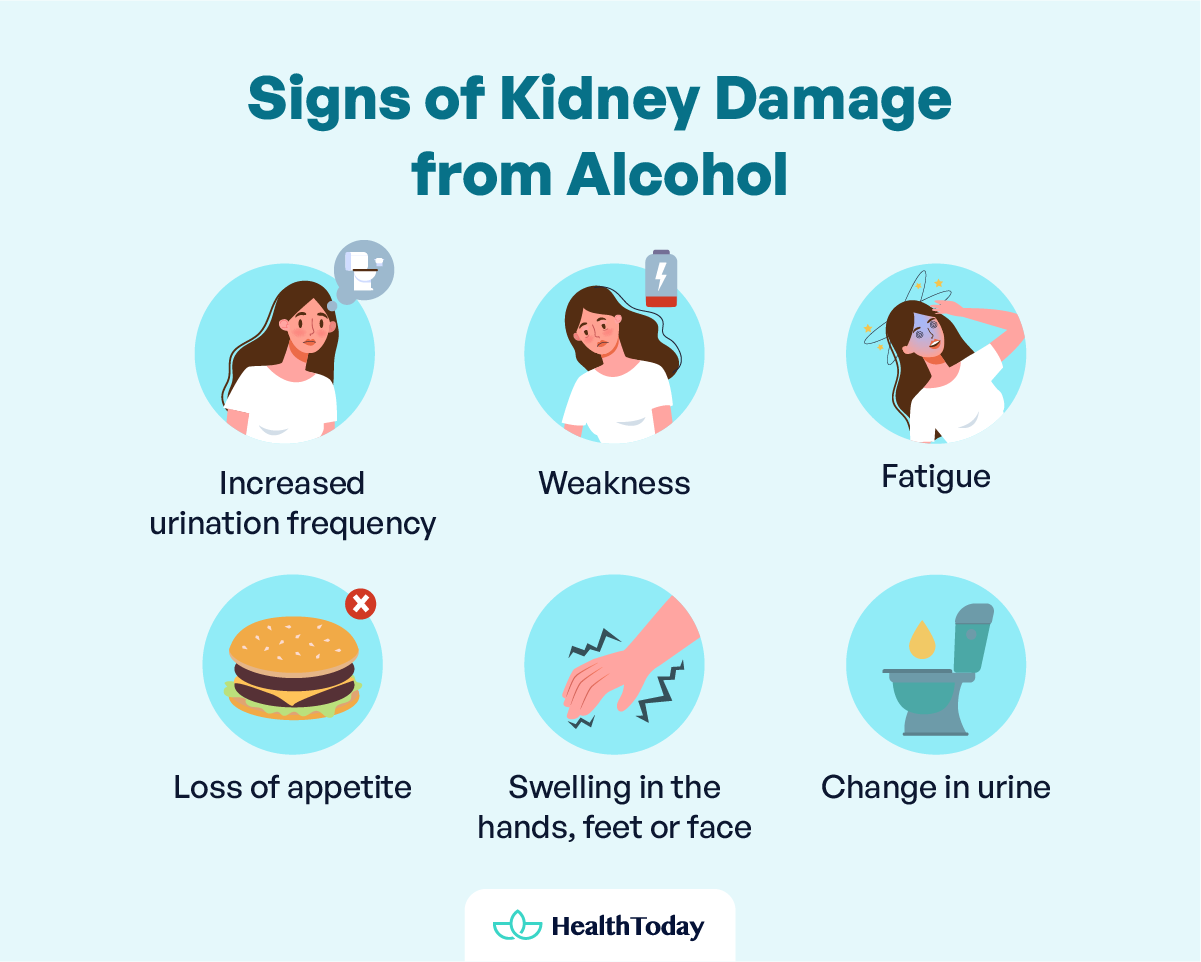Table of Contents
Alcohol, one of the most consumed beverages worldwide, affects our health in many ways, including our kidneys. High alcohol consumption can have both short-term and long-term effects on kidney health.
In this article, we will discuss the long-term effects of alcohol on the kidneys, the first signs of kidney damage from alcohol, and all the important facts you need to know.

How does alcohol affect kidneys?
The kidneys are vital in maintaining the body’s internal balance and overall health. These bean-shaped organs filter waste products, excess fluids, and toxins from the blood to form urine.
Additionally, the kidneys help regulate blood pressure, stimulate red blood cell production, and contribute to bone health. Various factors affect their function, including alcohol intake.
Can drinking cause kidney failure?
Certain foods and beverages affect kidney function. For instance, a high intake of sugary beverages or high-sodium foods may strain the kidneys (1, 2), potentially leading to kidney damage over time. Drinking alcoholic drinks may also negatively impact our kidneys.
Several studies showed that long-term, heavy alcohol use is associated with kidney failure (3). A study found that chronic drinkers experience partial recovery of their kidney function within just 30 to 49 days of alcohol abstinence. This suggests that prolonged heavy drinking may put significant stress on our kidneys (4).
Heavy alcohol use can lead to kidney failure (5, 6). This happens when the kidneys lose the ability to properly filter blood and maintain proper fluid and electrolyte balance (7). The condition results in the accumulation of toxins and waste products. In severe cases, dialysis or a kidney transplant is needed for survival (8).
However, the effect of alcohol on kidney function remains inconclusive. In fact, some studies show drinking alcohol has no association with kidney diseases (9).
It’s worth noting that the harmful effects of alcohol may outweigh the potential benefits. Limiting alcohol intake is important to protect your kidneys and overall health. In addition, consuming enough water is crucial to support proper kidney function.
What are the first signs of kidney damage from alcohol?

In the early stages, kidney damage from alcohol may not be noticeable (10). However, as the condition progresses, certain signs may appear. Some of the first signs of kidney damage from alcohol include (11):
- More frequent urination, especially during the night
- Weakness
- Fatigue
- Loss of appetite
- Swelling in the hands, feet, or face due to fluid retention
- Change in urine (darker and foamy urine or blood in the urine)
It’s essential to be attentive and seek medical help if you observe any such symptoms, especially changes in your urine.
Long-term effects of alcohol on the kidneys
Long-term alcohol use can have significant and lasting effects on the kidneys. One of the primary long-term effects is the development of alcohol-induced kidney disease (12). This condition is characterized by inflammation and scarring on the kidney (13).
Chronic alcohol use also interferes with the kidney’s ability to maintain blood pressure (14). High blood pressure damages the blood vessels in the kidneys, reducing their efficiency in filtering blood (15). As a result, kidney function deteriorates over time, increasing the risk of developing chronic kidney disease (CKD).
Alcohol use can also promote the kidney-damaging formation of harmful compounds called reactive oxygen species (ROS).
These compounds may cause oxidative stress and inflammation that damage kidney structures (16, 17, 18). On top of that, oxidative stress can worsen existing kidney problems. If the condition becomes severe, it will ultimately lead to kidney failure.
Summary
Long-term, heavy alcohol use can lead to acute kidney injury, chronic kidney disease, and kidney failure. Moderate alcohol use may have no relation to kidney disease, but you should limit alcohol intake to protect your kidneys and overall health. Some of the first signs of kidney damage from alcohol are increased urination frequency, changes in urine, weakness, and fatigue.

Can kidneys recover from alcohol damage?
Kidney failure and alcohol use are often linked, and it seems there’s no turning back once damage is done.
However, if the damage is detected early and alcohol consumption is stopped, the kidneys may gradually recover and regain their partial or full function (4, 19).
In addition to the severity of the damage, the kidney’s ability to recover depends on the duration and intensity of alcohol consumption and the individual’s overall health.
Although the kidneys have a regenerative capacity, there are limits to their recovery. Extended and severe conditions, such as CKD or kidney failure, might be irreversible. Treatment options such as dialysis or kidney transplantation may become necessary (20).
The best approach to protecting kidney health from alcohol-related harm is prevention. Essentially, limiting alcohol consumption is key to reducing the risk of kidney damage. Besides that, adopting a healthy lifestyle like staying hydrated, eating a balanced diet, and exercising regularly can help support overall kidney function.
Is beer good for your kidneys? If yes, why?
While some might argue that moderate beer consumption could offer certain benefits, it’s important to consider the broader picture.
Despite claims of potential advantages from moderate consumption, beer can have negative health implications. In fact, its caloric content can contribute to weight gain, a risk factor for kidney disease (21, 22).
Furthermore, certain compounds found in beer, such as d-amino acids (DAAs), might contribute to elevated uric acid levels in the blood, which can negatively affect kidney function (23).
Higher uric acid levels increase the risk of gout, a painful condition characterized by inflammation and joint swelling.
So, the potential kidney health risks associated with beer consumption need careful consideration. It’s always better to avoid drinking any kind of alcohol.




Red wine and kidney disease: What you should know
Red wine might offer potential health benefits, especially for the heart and kidneys, when you consume it in moderation. Some studies even suggest that red wine may contain health-supporting compounds like resveratrol and antioxidants (24, 25).
However, the World Heart Federation (WHF) has clarified that no alcohol, including wine, benefits heart health (26). They emphasize that alcohol is linked to health risks regardless of the amount consumed. The previous belief that moderate red wine is beneficial has been debunked. In fact, it has been shown to provide no health benefits (26, 27).
Therefore, while some might claim that red wine protects the kidneys and overall health, recent research findings suggest this claim needs careful reconsideration. It’s important to note that refraining from alcohol is preferable for overall health and well-being.
Can drinking cause kidney cancer? Risks and preventions
The relationship between alcohol and kidney cancer remains unclear. This is due to various factors that influence the risk of kidney cancer, including the amount and duration of alcohol use, individual responses, and other lifestyle factors.
Moreover, even if alcohol may help prevent kidney cancer, it can increase the risk of developing other cancers. In particular, studies have shown that alcohol can contribute to liver, breast, and colorectal cancers (28).
There are some measures we can take to prevent kidney cancer. One is limiting alcohol use to moderate amounts.
According to the National Institute on Alcohol Abuse and Alcoholism, moderate drinking is defined as no more than one drink per day for women and no more than two drinks per day for men (29).
However, The Lancet published a large-scale study that concluded that consumption of alcohol should be no more than 100 grams of alcohol per week (30), much lower than many countries’ current recommendations. Maintaining a healthy diet and engaging in physical activities can reduce the risk of kidney cancer (31, 32). Staying hydrated also helps your kidneys function optimally.




How many years of drinking does it take before kidney damage occurs?
It varies from person to person based on the amounts and frequency of alcohol consumed, genetics, overall health, and lifestyle. For some people, heavy alcohol use can cause kidney damage after years of consumption, while it may happen sooner for others.
What drinks are bad for the kidneys?
Excessive consumption of several beverages can be harmful to the kidneys. This includes alcohol, sugary, and high-sodium beverages, such as vodka, sodas, energy drinks, and sweetened juices.
Can alcohol cause high protein in the blood?
Yes, alcohol can cause high protein in the blood due to liver damage and inflammation.
Too much alcohol use can lead to liver disease called hyperalbuminemia. This condition may cause abnormal protein production or protein leaking into the blood.
Why is there blood in urine after drinking alcohol?
Blood in the urine (hematuria) after drinking alcohol may be a sign of kidney damage. Other possibilities include urinary tract infection (UTI), bladder inflammation, cancer, liver disease, or other underlying medical conditions.
Certain foods, such as beets, blackberries, and fava beans, may cause your urine to turn red. Drugs like rifampin may also color your urine. Consult your doctor if you notice blood in urine.
Can alcohol affect creatinine levels?
Yes, alcohol use can lead to dehydration, temporarily increasing creatinine levels. Excessive alcohol consumption can damage the kidneys and, consequently, elevate creatinine levels.
Is alcohol bad for stage 3 kidney disease?
Yes, alcohol use is generally bad for stage 3 kidney disease. At that stage, the kidneys have moderate damage and are not functioning at full capacity. Additional alcohol use can stress the kidney even further and worsen kidney function.
Summary
Drinking too much alcohol may cause kidney disease. In the long run, it might even cause CKD and kidney failure. However, various factors like the amount consumed, the duration, and individual response to alcohol can influence the effects. Maintaining a healthy lifestyle protects kidney health. Some of the first signs of kidney damage from alcohol are increased urination frequency, weakness, and fatigue. It’s important to limit alcohol use to the recommended amount. What is the recommended amount? According to a study published in The Lancet, it is 100 grams of alcohol per week (30). This equals 5 cans of beer, 12 shots of whisky, or 3.5 cups of wine.

















Comments
0